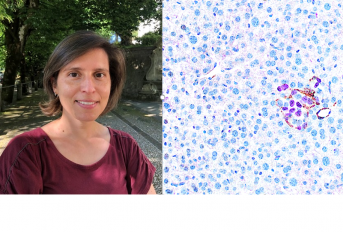Associação Portuguesa de Investigação em Cancro
Natural killer cells put breast cancer to sleep
Natural killer cells put breast cancer to sleep

Even after apparently successful treatment of primary tumor, some undetectable tumor cells can persist and cause cancer to eventually come back. These cells spread beyond the primary tumor to other organs of the body, where they lay dormant until awakening into deadly metastases. A research team from Switzerland has just published an article in Nature, led by the Portuguese scientist Ana Luisa Correia, revealing a special type of cells that can prevent the development of liver metastases from breast cancer, and points towards a novel therapeutic strategy that could put these tumor cells to sleep during a long time.
Authors and afilliations:
Ana Luísa Correia1,2,3*, Joao C. Guimaraes4,11, Priska Auf der Maur1,3, Duvini De Silva1,2,11, Marcel P. Trefny1, Ryoko Okamoto1,2,3,12, Sandro Bruno2,13, Alexander Schmidt5, Kirsten Mertz6, Katrin Volkmann1,3, Luigi Terracciano7, Alfred Zippelius1,8, Marcus Vetter8,9, Christian Kurzeder9,10, Walter Paul Weber3,10, and Mohamed Bentires-Alj1,2,3*
1 Department of Biomedicine, University of Basel, Basel, Switzerland
2 Friedrich Miescher Institute for Biomedical Research, Basel, Switzerland
3 Department of Surgery, University Hospital Basel, Basel, Switzerland
4 Computational and Systems Biology, Biozentrum, University of Basel, Basel, Switzerland
5 Proteomics Core Facility, Biozentrum, University of Basel, Basel, Switzerland
6 Institute of Pathology Liestal, Cantonal Hospital Basel-land, Liestal, Switzerland
7 Institute of Pathology, University Hospital Basel, Basel, Switzerland
8 Department of Medical Oncology, University Hospital Basel, Basel, Switzerland
9 Gynecologic Cancer Center, University Hospital Basel, Basel, Switzerland
10 Breast Center, University of Basel and University Hospital Basel, Basel, Switzerland
11 Present address: F. Hoffmann-La Roche AG, Basel, Switzerland
12 Present address: Department of Biosystems Science and Engineering, ETH Zürich, Basel, Switzerland
13 Present address: Novartis Institutes for BioMedical Research, Basel, Switzerland
Abstract:
The persistence of undetectable disseminated tumour cells (DTCs) after primary tumour resection poses a major challenge to effective cancer treatment1,2. These enduring dormant DTCs are seeds of future metastases, and the mechanisms that switch them from dormancy to outgrowth require definition. Because cancer dormancy provides a singular therapeutic window to prevent metastatic disease, a comprehensive understanding of the distribution, composition and dynamics of dormant DTC reservoirs is imperative. Here we reveal tissue-specific microenvironments that restrain or allow progression of breast cancer in the liver, a frequent site of metastasis3 and often associated with patients’ cause of death4. Using mouse models, we show that the dormant milieu features a selective rise in natural killer (NK) cells. Adjuvant interleukin-15-based immunotherapy ensures an abundant NK cell pool that sustains dormancy through interferon-γ signalling, preventing hepatic metastases and prolonging survival. Exit from dormancy follows a dramatic contraction of the NK cell compartment and concurrent accumulation of activated hepatic stellate cells (aHSCs). Our proteomics studies on liver co-cultures implicate the chemokine CXCL12 secreted by aHSCs in inducing NK cell quiescence via its cognate receptor CXCR4. Expression of CXCL12 and aHSC abundance are closely correlated in patients with liver metastases. Our data identify the interplay between NK cells and aHSCs as a master switch of cancer dormancy, and suggest that therapies aimed at normalizing the NK cell pool might succeed in preventing metastatic outgrowth.
Journal: Nature
Link: https://www.nature.com/articles/s41586-021-03614-z
Open source link: https://rdcu.be/clOfV




